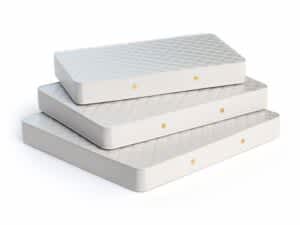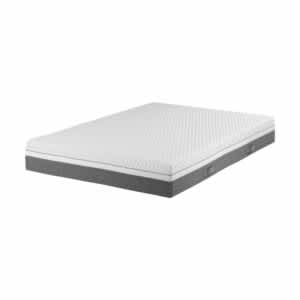If you’re looking for a compact, budget-friendly bed, a full size mattress is a good choice. These mattresses are bigger than twin size beds, but take up less space than larger sizes like queen and king. However, before choosing a mattress size, you should consider your needs and preferences, as well as your current sleeping arrangements.
We’ll go over full size bed dimensions and how they compare to other standard mattress sizes. We’ll also explain which types of sleepers benefit most from full size mattresses, and what to consider before choosing this size.
For a more detailed guide to mattress buying as well as expert-tested recommendations, check our picks for the best mattresses.
Let Us Help You Find the Perfect Bed
Answer a few questions to find the right mattress for your unique needs
Dimensions of a Full Size Bed
A full size mattress measures 54 inches wide by 74 inches long, which translates to around 27.75 square feet of surface area. It’s one of six standard mattress sizes — twin, twin XL, full, queen, king, and California king — with consistent measurements that make it easy to pair accessories like foundations and bedding.
However, there may be minor variation in mattress size dimensions between manufacturers.
Twin XL vs. Full vs. Queen Mattresses
Twin XL and full size mattresses are both popular with solo sleepers, but their sizes accommodate different needs and preferences. Full size mattresses offer more space to move around, measuring 16 inches wider than twin XL beds. For taller sleepers, twin XL beds are 6 inches longer than full size mattresses. In general, twin XL beds are priced lower than full size.
Full size and queen size mattresses differ in both length and width. Queen beds measure 6 inches wider and 6 inches longer than full size mattresses. The extra width in particular makes queen mattresses better suited to co-sleeping. However, the additional surface area also makes them more expensive.
| Mattress Size | Dimensions |
|---|---|
| Twin XL | 38″ x 80″ |
| Full | 54″ x 74″ |
| Queen | 60″ x 80″ |
Who Should Sleep on a Full Size Bed?
A quality full size bed is an excellent choice for many types of sleepers, including children and teens, adult solo sleepers, and those with limited space. Full size mattresses offer significantly more space to move around than smaller sizes like twin and twin XL, but they are still space-efficient and budget-friendly compared to larger sizes like king and queen. We’ll detail which groups benefit most from this size and why.
- Single Adults: While they may feel cramped to adult couples, full size mattresses offer ample width for a single adult to stretch out or change position during the night.
- Teenagers and Growing Kids: A full size bed offers width that the narrower twin size lacks, allowing teenagers and growing children to stretch out and move around.
- Budget-Conscious Shoppers: Since they’re smaller than king and queen mattresses, full size beds also tend to cost less, making them a popular choice for shoppers on a budget.
- Sleepers with Small Rooms: The compact size of full size mattresses makes them great for rooms with limited available space.
- Co-sleeping Children: The 27 inches of space available for each co-sleeper on a full size mattress is enough for two children to sleep comfortably beside each other.
Ask the Sleep Doctor
Have questions about sleep? Submit them here! We use your questions to help us decide topics for articles, videos, and newsletters. We try to answer as many questions as possible. You can also send us an email. Please note, we cannot provide specific medical advice, and always recommend you contact your doctor for any medical matters.


































